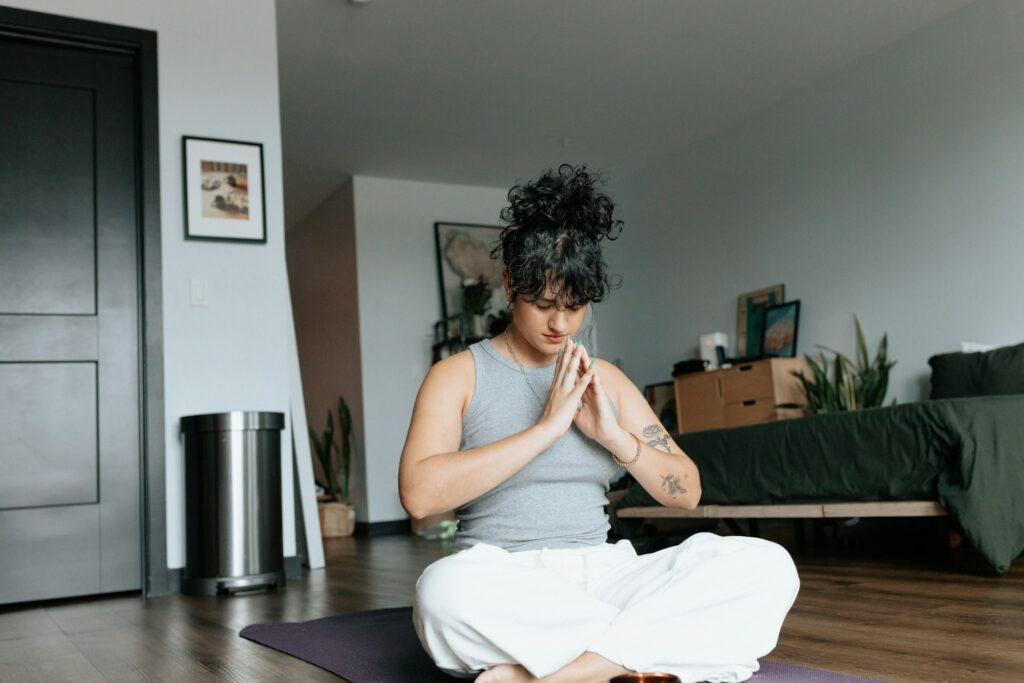We’ve all heard about mindfulness and the benefits it brings, like reducing stress, improving focus, and helping us be more present.

The problem is that when life is packed with work, social obligations, and a never-ending to-do list, the idea of setting aside an hour every day for mindfulness seems like a luxury you just don’t have. So, does that mean mindfulness is off the table for you? Not really—you just have to learn how to incorporate mindfulness into your day in short bursts, in moments that don’t require you to set aside huge chunks of time. You don’t need an hour of quiet to tap into the benefits; you just need to find small pockets of time when you can reset, breathe, and check in with yourself. Here’s how you can make mindfulness work, even with a packed schedule.
It’s about small moments of awareness.

You don’t need to be sitting cross-legged on a yoga mat with candles lit around you to practise mindfulness. In fact, one of the easiest ways to bring mindfulness into your day is by becoming more aware of what’s happening around you in the present moment. It can be as simple as paying attention to how your body feels when you sit down at your desk, noticing the taste of your coffee as you take your first sip, or listening to the sound of rain falling outside. These little moments of awareness throughout the day can bring you back into the present and away from the chaotic whirlwind of thoughts that tend to take over. You don’t need hours to benefit from mindfulness, just a few seconds here and there.
Use your commute as a mindfulness moment.

If you’re someone who drives or takes public transport to work, it might seem like a busy time that’s meant for mentally preparing for the day ahead. But it can also be a perfect opportunity for a bit of mindfulness. Try leaving your phone alone for the journey and focus on your breath or what you can see around you. Notice the details you might usually ignore—how the light changes as you drive, the sounds of the car or the train, the people around you. You can even take this time to practise a few deep breaths to calm your mind and centre yourself before the day starts. The goal is to make the most of these seemingly unproductive moments, turning them into something meaningful that helps you feel more grounded.
Take mindful breaks throughout the day.

Instead of scrolling through your phone or grabbing another cup of coffee during your breaks, use the time to simply check in with yourself. You don’t need to carve out 20 minutes to meditate—start with just five minutes of focusing on your breath or stretching your body. This doesn’t require any special skills or equipment, just a quiet space where you can pause, breathe, and reset. For instance, sit in a quiet corner and close your eyes for a minute, inhale deeply, and slowly exhale. Even this short amount of time can help bring you back to the present moment and reduce feelings of overwhelm.
Mindful eating: Take a moment to appreciate your food.

How often do you rush through your meals without really tasting what you’re eating? Mindful eating is all about slowing down and fully experiencing the act of eating, even if it’s just for a few minutes. Whether you’re having lunch at your desk or grabbing a snack between meetings, take a moment to savour the flavours, notice the textures, and appreciate the food in front of you. Put your phone down, take a few deep breaths, and focus on the experience of eating without distraction. This simple practice can help you feel more present and connected to the moment, instead of feeling rushed or disconnected from your surroundings.
Do some mindful breathing when you’re feeling stressed.

When you’re feeling overwhelmed, your breath can become shallow and fast, which can fuel anxiety and stress. Instead of getting lost in the spiral, take a few moments to check in with your breath. You don’t need to spend 20 minutes doing breathing exercises; just a couple of minutes can make a world of difference. Sit comfortably, close your eyes, and take a few deep, slow breaths. Focus on the sensation of air entering and leaving your body, letting go of any tension with each exhale. Mindful breathing is an incredibly simple tool that helps bring you back to the present, calm your nervous system, and reduce stress, all without needing to block out an hour of your day.
Do one thing at a time.

Multitasking is often celebrated as a way to be more productive, but in reality, it can increase stress and make it harder to focus. Instead, try the mindfulness practice of single-tasking. Whether you’re writing an email, having a conversation, or cooking dinner, focus fully on just one thing at a time. Notice how your body feels as you do it, how your hands move, and how the task unfolds. This doesn’t mean you can’t get things done; it just means that by giving your full attention to one task at a time, you’re likely to feel more productive, less overwhelmed, and more present in your life.
Use reminders to bring you back to the present.

If you’re someone who’s constantly running from one thing to the next, it’s easy to forget to be present. But little reminders throughout the day can help keep you grounded. Set an alarm on your phone for a few minutes of mindfulness, or put a sticky note on your desk that says “breathe” or “pause.” These simple reminders can gently nudge you back into the present moment and encourage you to slow down, especially if you’re feeling scattered or stressed. Over time, these reminders can help make mindfulness a natural part of your day.
Remember that mindfulness doesn’t have to be perfect.

The biggest misconception about mindfulness is that you have to “do it right” to get the benefits. But mindfulness isn’t about being perfect; it’s about being real. It’s about showing up for yourself, even if it’s only for a few minutes. If your mind starts to wander, that’s completely normal; just gently bring it back to the present moment. There’s no need to judge yourself or expect perfection. The goal is simply to connect with yourself and the present moment, and every time you do that, it’s a win.
Mindfulness isn’t about hours of work; it’s about intention.

Mindfulness isn’t a time-consuming task; it’s about making a change in how you approach life. It’s about being intentional with your time and energy, even if it’s just for five minutes here and there. You don’t have to tick a box or do it perfectly. Instead, focus on finding small moments in your day when you can pause, breathe, and simply be. Over time, those little moments add up, making mindfulness a natural and beneficial part of your daily routine.


